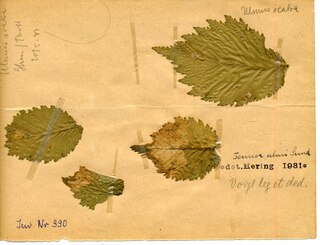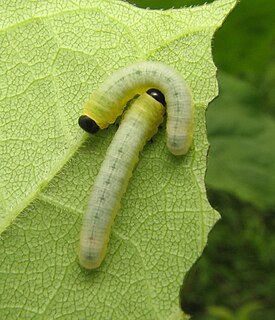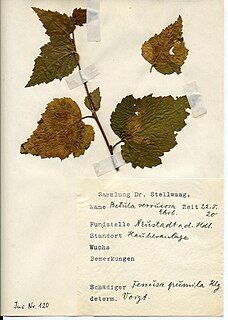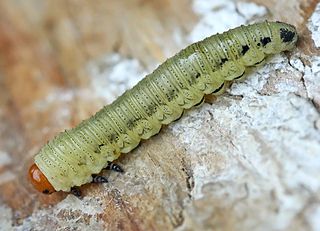
Sawflies are the insects of the suborder Symphyta within the order Hymenoptera alongside ants, bees and wasps. The common name comes from the saw-like appearance of the ovipositor, which the females use to cut into the plants where they lay their eggs. The name is associated especially with the Tenthredinoidea, by far the largest superfamily in the suborder, with about 7,000 known species; in the entire suborder, there are 8,000 described species in more than 800 genera. Symphyta is paraphyletic, consisting of several basal groups within the order Hymenoptera, each one rooted inside the previous group, ending with the Apocrita which are not sawflies.

The Pergidae are a moderate-sized family of sawflies occurring in the Western Hemisphere and the Australasian Region. The Pergidae are, with almost 450 described species, the third-largest family of Symphyta after the Tenthredinidae and the Argidae. Morphologically, most pergids are typically sawfly-like, but the form of the antennae varies considerably in number of segments and from simple to serrate and pectinate or even bipectinate. Sexual dimorphism is common and reflected in differences in type of antennae, colour, and size. Included are some of the few known apterous sawflies, those of the genus Cladomacra occurring in Papua New Guinea and Indonesia, and a species with brachypterous females, Clarissa tasbates, in Tasmania.

Tenthredinidae is the largest family of sawflies, with well over 7,500 species worldwide, divided into 430 genera. Larvae are herbivores and typically feed on the foliage of trees and shrubs, with occasional exceptions that are leaf miners, stem borers, or gall makers. The larvae of externally feeding species resemble small caterpillars. As with all hymenopterans, common sawflies undergo complete metamorphosis.

Nematinae is a subfamily of sawflies belonging to the family Tenthredinidae. It contains over 1250 described species in ~40 genera. Members of this subfamily feed on a wide range of plants and employ a wide range of feeding habits, both internally and externally, on their host plants.

Allantinae is a subfamily of sawflies in the family Tenthredinidae, and the largest subfamily of that family, with about 110 genera. The subfamily is considered to consist of five to six tribes, and are medium to large sawflies.

Tenthredo scrophulariae, the figwort sawfly is a species of the family Tenthredinidae, subfamily Tenthredininae.

Monostegia is a genus of sawfly. The authority is based on the description by Achille Costa and Oronzio Costa, although earlier work grants this to Fabricius 1798., though the commonest species, M. abdominalis, bears the authority of Fabricius.

Endelomyia is a genus of common sawflies in the family Tenthredinidae. There are at least two described species in Endelomyia.

Eriocampa is a genus of common sawflies in the family Tenthredinidae. There are about ten described species in Eriocampa.

Monsoma is a genus of common sawflies in the family Tenthredinidae. There are at least two described species in Monsoma.

Fenusa dohrnii, the European alder leafminer, is a species of common sawfly in the family Tenthredinidae. It is found in Europe.

Fenusa ulmi, the elm leafminer, is a species of common sawfly in the family Tenthredinidae. It is found in Europe.

Tethida is a genus of common sawflies in the family Tenthredinidae. There is one described species in Tethida, T. barda.

Ametastegia is a genus of common sawflies in the family Tenthredinidae. There are about 16 described species in Ametastegia.

Schizocerella is a genus of sawflies in the family Argidae. There are at least two described species in Schizocerella.

Sphacophilus is a genus of sawflies in the family Argidae. There are more than 30 described species in Sphacophilus.

Profenusa thomsoni, the amber-marked birch leaf miner, is a species of sawfly in the family Tenthredinidae. It is native to the Palearctic realm but has spread to North America. The larvae feed on the foliage of birch trees.

Fenusa pumila, the birch leafminer, is a species of sawfly in the family Tenthredinidae. It is found in Europe and has been introduced into North America.

Macremphytus is a genus of common sawflies in the family Tenthredinidae. There are at least four described species in Macremphytus.

Diprion is a genus of conifer sawflies in the family Diprionidae. There are at least 12 described species in Diprion.



















